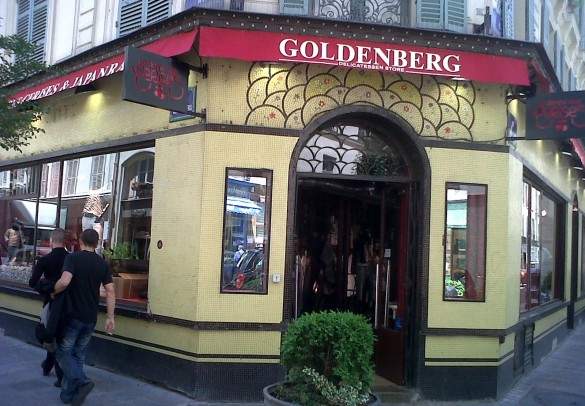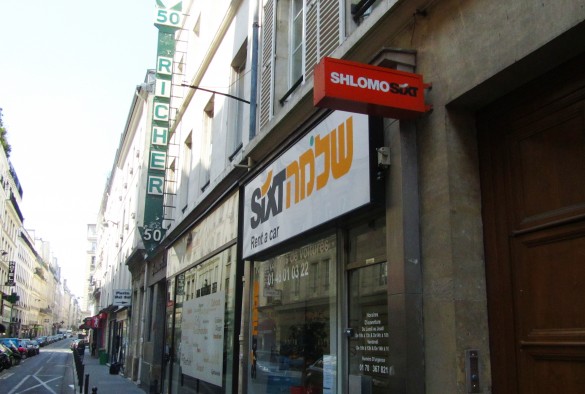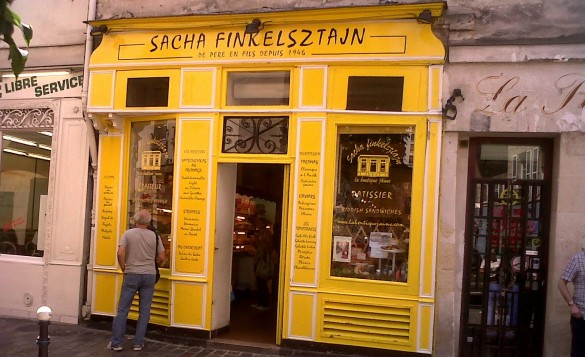The area around the Rue des Rosiers has long been known as the “Jewish Quarter” of Paris. While this has always been partly true and partly misleading, the centre of Jewish cultural life in the capital is slowly shifting north.
Jo Goldenberg’s restaurant on the Rue des Rosiers had been an institution for decades. More than anything else, it served as a powerful symbol for the resilience of Jewish life in the capital (Goldenberg himself had lost his parents and sisters in the Holocaust), equally powerful for friends and foes alike – which was also why, one may assume, it became the target for one of the worst ever terrorist atrocities on French soil.
On 9 August 1982, Palestinian gunmen threw grenades into the dining room and fired indiscriminately into the crowd. Six people died that day, and for years after, you could still see the bullet holes in the shop window. Windows that had been shuttered and boarded up for longer than most people in the area care to remember.

When the restaurant, after much to-ing and fro-ing, finally went on the property market in 2008, the spotlight of the world’s media fell once more on Goldenberg’s: the place again became a symbol, this time for the impending death of Paris’s Jewish Quarter.
Goldenberg’s, after all, was only the latest in a long row of the quarter’s Jewish businesses overwhelmed by the incoming tide of souvenir shops and swanky fashion boutiques. What the bulldozers of Baron Haussmann’s urban renewal schemes in the 19th century and Nazi storm troopers (who dynamited the near-by Rue Pavee synagogue on Yom Kippur 1941) had failed to accomplish, the irresistible forces of capitalism appeared to bring about.
A little flashback into history
Jews have lived in Paris since late antiquity, on and off between various expulsions, but their numbers remained small until the late 19th century.
Between 1870 and 1939, however, the number of Jews living in the French capital shot up from 6,000 to about 200,000, making Paris the third largest Jewish city in the world (behind Warsaw and New York). What had happened?
For one, throughout much of this period, large numbers of Jews continued to arrive from Eastern Europe on their escape from Czarist pogroms. For another, however, many French Jews also came to Paris, having left their homes in the Alsace and Lorraine when these provinces were annexed by Kaiser Wilhelm’s Germany in 1871.
These two groups of immigrants had little in common – poor shtetl Jews on the one hand, members of the middle classes and the bourgeoisie on the other (such as the parents of Alfred Dreyfus, he of the infamous affaire) – apart from their religious beliefs.
And even these were so irreconcilable that these two tribes ultimately opted to pray apart: the first in the synagogue on the Rue Pavee, the latter in the grandiose synagogue on the Rue de la Victoire (built largely with donations from the Rothschild family).
75 percent of the Jews in France survived the Holocaust, far more than in any other Nazi-occupied country. It is said that the Vichy regime willingly, perhaps even enthusiastically rounded up the Jewish immigrants from Eastern Europe but often did what it could to protect those Jews who were born in France.
After the war, about 200,000 Jews still lived in France, a number that was set to swell substantially in the wake of the Jewish exodus from the former French colonies in North Africa. Already by 1968, Sephardic Jews from the Southern Mediterranean rim outnumbered their Ashkenazi cousins.
Today, between 500,000 and 600,000 Jews live in France, mainly in Paris and her suburbs, and Jewish life in the capital carries a distinctly middle eastern flavour. Falafel and couscous are the standard fare of kosher restaurants, also in the Rue des Rosiers where Sephardic immigrants from Morocco and Tunisia have long replaced the Jews from Eastern Europe. Goldenberg’s with his borsht and latkes was, in many ways, the last of his kind.

Businesses, meanwhile, go where they can survive, and kosher butchers and delis are no exception. The Rue des Rosiers, in the middle of the très cher, très chic Marais has become the victim of its own success. The sons and daughters of the kosher butchers and bakers had moved on in life, into better jobs and bigger houses, and the annual rent for Goldenberg’s climbed to a rumoured € 300,000. That’s a lot of Pastrami sandwiches.
While a few Jewish businesses hold out in the Rue des Rosiers – such as Sasha Finkelsztajn’s grandly old-fashioned bakery – the heart of Jewish life has quietly moved northwards to the east of the Rue de la Victoire synagogue.
Douieb (11 Rue Geoffroy Marie) and Les Ailes (34 Rue Richer) provide a wide range of kosher delicacies from the Maghreb, and the Cafe Dizengoff (27 Rue Richer; who can resist its proudly displayed “Finnish Spoken” sign?) offers kosher versions of “French fast food” (such as crepes).
The innocuously named “Best Western Aida Opera” next door, meanwhile, is actually the capital’s unofficial home away from home for Jewish visitors – it serves kosher breakfast, has a mezuzah on the front door, and for the Shabbath, you can replace your key card with a proper door key.
If you are a bit puzzled why anybody would want to do that and if you have no idea what a mezuzah is, the rest of this article is not really for you. However, if you do, you may want to skip the eating places around the Rue Richer altogether and go out to search for something somewhat more adventurous. Paris, after all, is the place to go for Jews who have it up to here with salted beef and gefilte fish.

Almost any cuisine in the world is offered up in a kosher version, most notably TexMex (Tchapai, 53 Rue Amelot in the 11th arrondissement), Thai (Yung Pana, nearby on 115 Boulevard Voltaire) and, of course, Japanese: Izaaki on 33 Rue Lafayette (around the corner from Rue Richer) enjoys the reputation of being the finest kosher Japanese restaurant in the world.
And if you really, really feel that you cannot survive one day longer without a salted beef sandwich: you can find packed Pastrami stashed away into the far corner of the Naouri kosher supermarket on 20 Rue Richer. The same shop also does a nice line in kosher bread.
Es gezunderheyt!
Michael Schuermann worked as a journalist for more than twenty years, initially for the BBC in London and later for the European Sports Network (former ESPN’s European affiliate), then in Paris (for another sports channel) where he has lived since 1993. He’s the author of guide book Paris Movie Walks – 10 Guided Walking Tours in the City of Lights! Camera! Action! and now blogs as Easy Hiker.